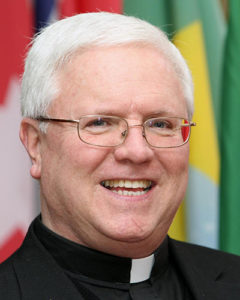On Jan. 25 is the Feast of the Conversion of St. Paul, when we commemorate a monumental event in the life of the early Christian church. Occurring in the years immediately following Christ’s death and resurrection, Paul’s conversion happened abruptly, but its effects have remained with us ever since, resounding throughout the centuries and speaking to humanity of the astounding power of God to intervene in our lives.
It happened on the road to Damascus, where Paul was on his way to capture Christians and bring them to Jerusalem for punishment. Just before entering the city to terrorize the followers of Christ, Paul was met with a flash of light and fell from his horse. Jesus then spoke to him, saying, “I am Jesus, whom you are persecuting; but rise and enter the city, and you will be told what you are to do.”
Paul was blind for three days after that miraculous encounter, until Jesus appeared in a dream to one of the Christians of Damascus telling him to go to Paul. The man went and laid his hands on Paul, who was healed in the name of Jesus. He was baptized, became part of the Christian community, and went on to become the greatest evangelist of his time.
It’s interesting to note that St. Stephen’s martyrdom laid the groundwork for Paul’s conversion because something happened at that event to plant a seed in Paul’s heart, a seed just waiting to grow once he discovered Christ. Paul was present at the stoning of St. Stephen, when the great apostle gave witness to the depths of his faith by forgiving his attackers even as they put him to death. As a figure in authority, Paul may have ordered the execution or was overseeing it in some manner, and one can only imagine the lingering effect Stephen’s act of forgiveness would have had on Paul and others involved.
Looking at these key points in time bracketing the conversion of St. Paul — from the seed of forgiveness planted in his heart at St. Stephen’s stoning, and culminating with the healing intervention of a follower of Christ — we see a dynamic that has played out repeatedly ever since the Holy Spirit was given to the church after the resurrection. This dynamic that comes to life so vividly in the story of Paul’s conversion is rooted in the reality that God desires to work through each one of us. This is why Christ came into the world, to enter the struggle of humanity in the most intimate and sacrificial way.
In working through us, Christ calls us to witness to each other, like St. Stephen’s witness of forgiveness. And he calls us to go to each other on healing missions in the way his follower from Damascus went to Paul. These witnesses were joined to the miraculous intervention of Christ on the road to Damascus to help inspire Paul to spend the rest of his life providing witness to others through preaching so exquisite, it is handed down to us as part of sacred Scripture itself.
Paul witnessed to us in the way he lived after his conversion and right up to the way he died, following in the footsteps of St. Stephen as a holy martyr of the church, giving up his life to join with the other martyrs and Christ himself in becoming the seed that produces good and lasting fruits. May St. Paul intercede for us and inspire us daily to take up our cross and follow Christ.
For a free copy of the Christopher News Note LOOK FOR THE BEST IN PEOPLE, write: The Christophers, 5 Hanover Square, New York, NY 10004; or email . Fr. Ed Dougherty is on the Christophers’ board of directors.

Maryknoll Father Edward M. Dougherty (CNS photo)
